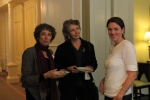Sunday, September 30th at 1pm, FRANK hosted “The Informed Collector,” a panel discussion at the Carolina Inn explaining how and why to collect fine art photography. Gallery directors Roylee Duvall, Gabrielle Larew, and Jennifer Schwartz, fine art photography collector Frank Konhaus, and moderator Kelly McChesney of Flanders Gallery delved into this topic, addressing the process of collecting for galleries and personal collections.
Roylee Duvall, director of Durham’s Through This Lens Gallery, kicked off the afternoon with a description of the photograph selection process he employs for his gallery. Duvall buys a range of works, some outside of his personal taste, to appeal to the palate of the general public.
Gabrielle Larew, director of the Doma of Charlotte, proceeded after, advising the buyer to purchase works that resonated with them. In her gallery, she promotes the displaying of both purchase-ready work and “museum-type work,” art that may not be as likely to sell but that is educational on the “breadth and depth of photography,” for the benefit of the community.
Frank Konhaus, Chapel Hill private collector, continued the afternoon with a discussion of his personal collection techniques. He explained from his gathering experience, artwork could be collected from many venues, traditional or non: photo fairs, museums, or even from the occasional juried college or high school photography competition.
Jennifer Schwartz, of the Jennifer Schwartz Gallery in Atlanta, GA, followed with her spin on collecting. Schwartz’s gallery focus is in presenting the emerging photographer to the public both in the gallery and community setting. Many of her recent and/or current projects involve traveling exhibitions and active community engagement in the arts.
During the discussion, speakers debated the topic of the edition in the digital age. In her Atlanta gallery, Jennifer Schwartz encourages artists to work in smaller edition sizes, no greater than 25 in number. Frank Konhaus acknowledges the importance of editioning contemporary works, but does not see a negative consequence of deciding against such. Roylee Duvall explained the changing nature of edition pricing, describing how as the edition dwindles, the remaining prints become more expensive.
Chief Curator of Charlotte’s The Light Factory Dennis Kiel launched a conversation on the traditional darkroom-based edition and how, in his opinion, those works are technically monoprints due to the sometimes unpredictable properties of darkroom chemicals.
A reception sponsored by the Carolina Inn followed.















